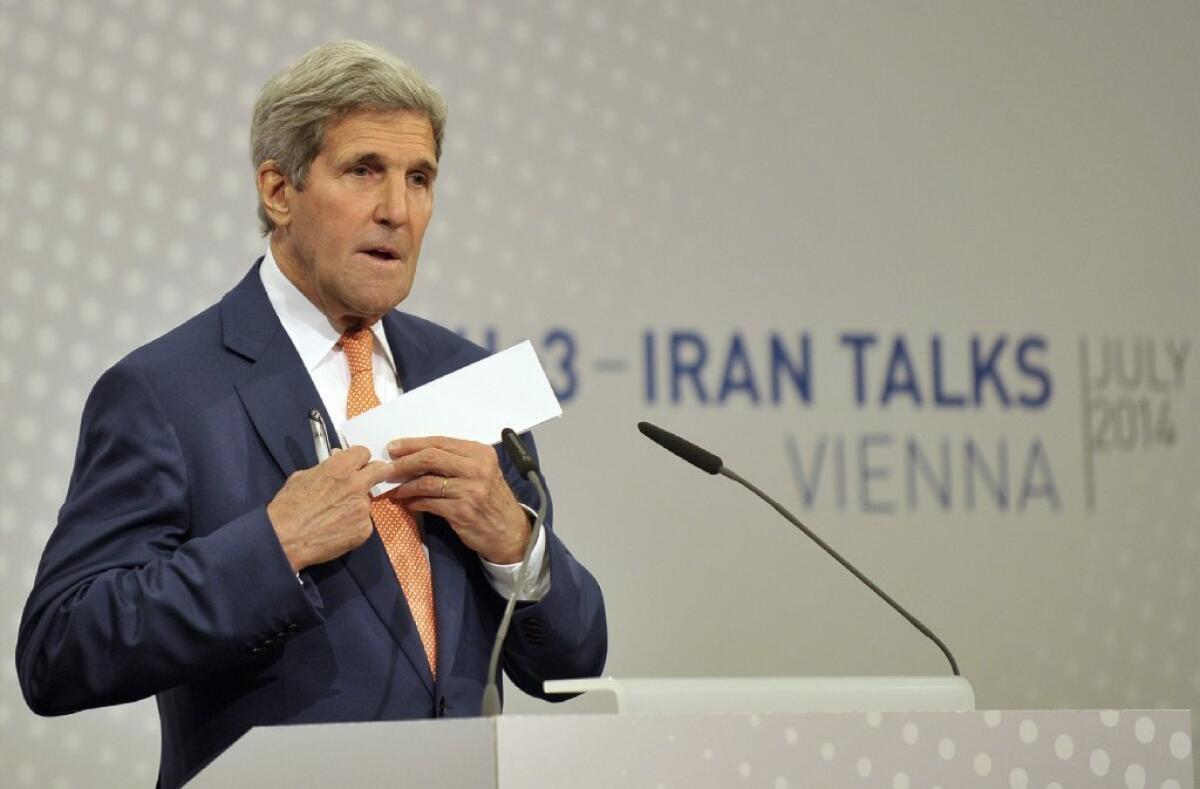Editorial: Don’t worry about the deadline and keep talking with Iran

- Share via
Sunday marks the deadline for an agreement on the future of Iran’s nuclear program. Despite indications from the participants in the talks that progress has been made, it seems unlikely that what Secretary of State John F. Kerry called “real gaps” can be closed in a few days. In particular, Iran is still at odds with the so-called P5-plus-1 countries — the five permanent members of the U.N. Security Council and Germany — about how much it will restrict the enrichment of uranium, a precursor to building a nuclear weapon. Iran has proposed to cap its operating centrifuges at the current 9,400, a number that would allow it to expand enrichment quickly.
It will be disappointing if Sunday comes and goes without a permanent agreement in which Iran convincingly commits itself to a purely peaceful use of nuclear power in exchange for an end to economic sanctions. But a missed deadline need not be a disaster — unless members of Congress jeopardize an extension of the negotiations by pressing for additional sanctions against Iran.
The possibility that the negotiations might have to be prolonged isn’t a new idea. The Joint Plan of Action that Iran signed last fall with the P5-plus-1 group explicitly said that the current interim agreement was “renewable by mutual consent.” Under the interim agreement, Iran has suspended progress on its nuclear program in return for limited sanctions relief.
As we observed at the time, the interim agreement isn’t a permanent solution and shouldn’t be extended again and again. But an extension of the arrangement past Sunday is amply justified both by the progress that has been made in the negotiations and by Iran’s adherence to the terms of the interim deal. The question isn’t whether the negotiators are interested in continuing the talks; they are. The question is whether they will be undermined by other actors.
And that brings us to Congress, where even during the current interim agreement, members from both parties have tried to “help” the negotiations by imposing new sanctions on Iran that likely would have had the opposite effect. (At least some members probably would welcome the collapse of negotiations, because they distrust the Iranian government and believe the only way to prevent Iran from acquiring nuclear weapons is with a military attack.)
A nuclear-armed Iran would be dangerous and destabilizing, and the U.S. was right to impose sanctions to bring it to the negotiating table. But now that talks are taking place and making progress, Congress should stand back. If it’s necessary to extend the negotiations past Sunday, President Obama must be prepared to defend the process and the prerogative of the president to conduct diplomacy with other countries — with his veto pen, if necessary.
Follow the Opinion section on Twitter @latimesopinion
More to Read
Sign up for Essential California
The most important California stories and recommendations in your inbox every morning.
You may occasionally receive promotional content from the Los Angeles Times.













